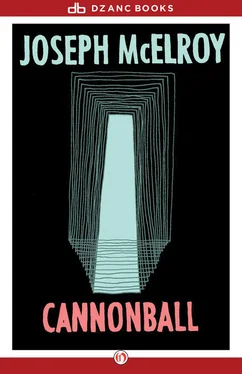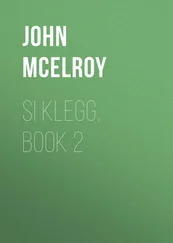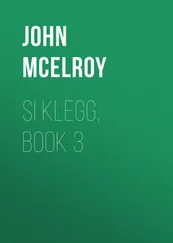Joseph McElroy - Cannonball
Здесь есть возможность читать онлайн «Joseph McElroy - Cannonball» весь текст электронной книги совершенно бесплатно (целиком полную версию без сокращений). В некоторых случаях можно слушать аудио, скачать через торрент в формате fb2 и присутствует краткое содержание. Год выпуска: 2013, Издательство: Dzanc Books, Жанр: Современная проза, на английском языке. Описание произведения, (предисловие) а так же отзывы посетителей доступны на портале библиотеки ЛибКат.
- Название:Cannonball
- Автор:
- Издательство:Dzanc Books
- Жанр:
- Год:2013
- ISBN:нет данных
- Рейтинг книги:5 / 5. Голосов: 1
-
Избранное:Добавить в избранное
- Отзывы:
-
Ваша оценка:
- 100
- 1
- 2
- 3
- 4
- 5
Cannonball: краткое содержание, описание и аннотация
Предлагаем к чтению аннотацию, описание, краткое содержание или предисловие (зависит от того, что написал сам автор книги «Cannonball»). Если вы не нашли необходимую информацию о книге — напишите в комментариях, мы постараемся отыскать её.
continues in McElroy's tradition of intricately woven story lines and extreme care regarding the placement of each and every word. A novel where the sentences matter as much as the overall story.
Cannonball — читать онлайн бесплатно полную книгу (весь текст) целиком
Ниже представлен текст книги, разбитый по страницам. Система сохранения места последней прочитанной страницы, позволяет с удобством читать онлайн бесплатно книгу «Cannonball», без необходимости каждый раз заново искать на чём Вы остановились. Поставьте закладку, и сможете в любой момент перейти на страницу, на которой закончили чтение.
Интервал:
Закладка:
Me? she touched my wrist. (I hadn’t thought what I was saying.) You know about all that. She taps my knuckle as I finish my drink and go to get up (we’re going).
No, I… — how’m I going to explain what I’d pictured, driving with Em from The Inventor’s into the Center, the car bomb with Livy’s name on it, boys, windowpane shivering, odor of cigarettes on the man’s fingers. “I must have heard,” I said, holding the door for her.
“No, I don’t believe so.” She smiles up at me in the dark, the outtake of breath from her nostrils, walking to our billet. Sometimes two people were better than one, she said. That campfire you approached (?), she said.
The person had vanished, I said. (We’ve double-checked the car, and taken the backpack with the harmonicas and her things.)
You have a sister, I recall.
I had never mentioned any sister. So Livy’s been briefed. (Who by? Does this come under briefing? Trickle-down intelligence.) I had hopes for her, and clear as many running feet in a ruined schoolyard a block away sounded distinct from the Metal Rock massing objective at a distance and distinct from, close by, the indigenous instrumental we had been told was about a murdered Palestinian child — it came to me that they were after maybe the Chaplain (Storm Nosworthy’s baby still at large) yet even Storm didn’t matter now at a distance except as someone associated with my father, and I asked Livy why she’d enlisted and she said she would dredge that up for me sometime, she was no prize package and—
Dredge? I’d brace myself. Perhaps so, she said.
Interested in her, but not without doubt, I told her something of a story inspired as the Russian in Chula V, the teller, had himself been inspired when, before shipping out again, I had come by the sound studio one day (bearing gifts in case).
A story the Russian for all his affable suspicion could not know had filled in my own: that the “water” archaeologist, the specialist, on the Scrolls team — who, that day of the palace, getting a brainstorm, was the one whose steps with a guard I had heard descending as I was making my getaway — and a third person trying to keep up — heard just as I dropped into the well current, like a casual death by elimination, Why I Enlisted opening unexpected reasons then as I sank and swam, some dredged-up remains of which from the virtual sky Livy herself had boat-hooked further down — this specialist, said the Russian on his own track, had got himself killed: what you get for a Mexico vacation but almost certainly had been investigating fallout from Scrolls explosion, the Russian had it on good authority (“eef you recall our conversation”—as if that had been what we’d talked about on the intensely inescapable tiles of a pool!). An archaeologist of water itself, said the Russian, holding forth a bit for present company but with a savor of intelligence — for who knows what “vahter” brings with it from where it was to where it will go, “he tell me heemself”—and where eez division between what-has-been and whatweel-be? — “a shout in the meedle of the air, eh,” the Russian adds (not lost on me): and water archaeologist had been drawn to the foundations of this palace as a sinkhole for the net of horizontal wells “like secret map across land before even Scrolls were found.”
Inspired by suspicion to tempt me to betray he didn’t quite know what — by delusions of tactics perhaps, the Russian had himself betrayed more than he knew: for the archaeology team-member whose steps coming down I’d heard along with those of guard and third party, was none other than the ill-fated specialist written up in the magazine I had underlined who’d been independently tracing someone not to be identified to Livy I knew, a friend (I thought now two friends, Umo and the Chaplain)—
nor, for safety’s sake, even the person with whom I stood my ground listening to the foreign sound engineer play the authority, interrupting himself to go and dive into his earphones, adjust a dial, keep us waiting, and come back — and something else that all but came to me, about the archaeologist getting a brainstorm at that moment after the explosion and after a soldier the Russian had talked with had just jumped down into the void.
But the Russian, a dark and gravitational or sinkhole or routine imagination but without real character, could never quite put real things together — my reluctance to learn he was not Russian but Ukraine; my vanishing down the bomb rupture in the palace diving well after the water; and the object of that archaeologist’s search then and later, what he might have said publicly and to Storm who might not want an actual Lazarus on his hands; then, home again in California weeks later, from his path one morning when he had some typically Russian or Ukrainian business I figured at the University looking up to see me observing him from the famous footbridge high above; our host only now in his place of work in Chula V recognizing the dark-haired girl close up who had been with me at the rail, her legs, her look, and recalling the “meedair shout,” yet that the archaeologist, with that profound specialty had been seeking not me but an underwater photographer (and Navy Chaplain) had entered the Russian’s brain no further than I had permitted it into my midnight story to Livy inspired by suddenly guessing her particular mission assigned by some headless HQ, though the Russian was much taken with my sister who had come with me to Chula V, for each to each a goodbye errand. What was hers? “Lucky your little war is done with,” he said.
He had lifted the earphones off and stared at a computer screen. So we had just stopped by? he went on, secretly alert. “Our Umo doesn’t work here any more,” he said, and laughed at his joke. Found something better, I said. Long tables, mixers, swivel chairs, screwdrivers, window into another room. I had something for Umo, I said. Em at the far end, the Russian let the phone ring, cagey, his back very straight, physically strong. Everyone has an instinct. “He’s prob’ly dying somewhere, I mean diving,” said the Russian, making a joke. “Nothing throws heem off.”
My gift would not be posthumous I felt sure. My sister had a good look around; returning to our end she might have been thinking of renting the place. She picked up a screwdriver, a big one with a black rubber handle, looked at it, a Phillips-head; looked at me, pouted. Russian measured the distance to Em’s humor, her eyes, her breasts, her hips, in a dress today, so it was in self-defense that he plotted the positions of everything here, equipment, speakers, job clipboards hanging, the sound of the phone. “He deed what I told him. Good working relationship.” And? “He told me things.”
“Yeah?” said Em. The Russian thought something was up, I thought of the deserter, the way Umo had been used, even of my father for an instant, whom I did not think of.
“Why he came here in first place. His trucking: where he went. He kept that wreck running. Music. The cops. Why he came here.”
“Why did he come here?” said my sister. Russian found this amusing. “Some t rr ash he read in a book. He gotta get some papers. That’s where you came in, right?” the Russian grinned at me narrowly. “He lied about age, no?” “What book?” my sister said.
“A nine-thousand-mile job with you guys and he doesn’t have papers?” I said.
In the eyes contempt beaming for an illegal trying to survive. “Papers we deescussed.”
“And the deserter?” I signaled Em, we were going. She picked up an invoice off a stack of cartons.
“Discussed many things. Mexico, drugs, music, Chula Vista, you and your vahter,” the Russian seemed to ignore my question. “Lied about his age?” “Both ways, up, down,” was the reply. “ Well ,” the Russian said then, sagely…“talked about you ,” he said, “and you ,” flicking his eyes at Em. “And your vahter when he shouted meedair.”
Читать дальшеИнтервал:
Закладка:
Похожие книги на «Cannonball»
Представляем Вашему вниманию похожие книги на «Cannonball» списком для выбора. Мы отобрали схожую по названию и смыслу литературу в надежде предоставить читателям больше вариантов отыскать новые, интересные, ещё непрочитанные произведения.
Обсуждение, отзывы о книге «Cannonball» и просто собственные мнения читателей. Оставьте ваши комментарии, напишите, что Вы думаете о произведении, его смысле или главных героях. Укажите что конкретно понравилось, а что нет, и почему Вы так считаете.












